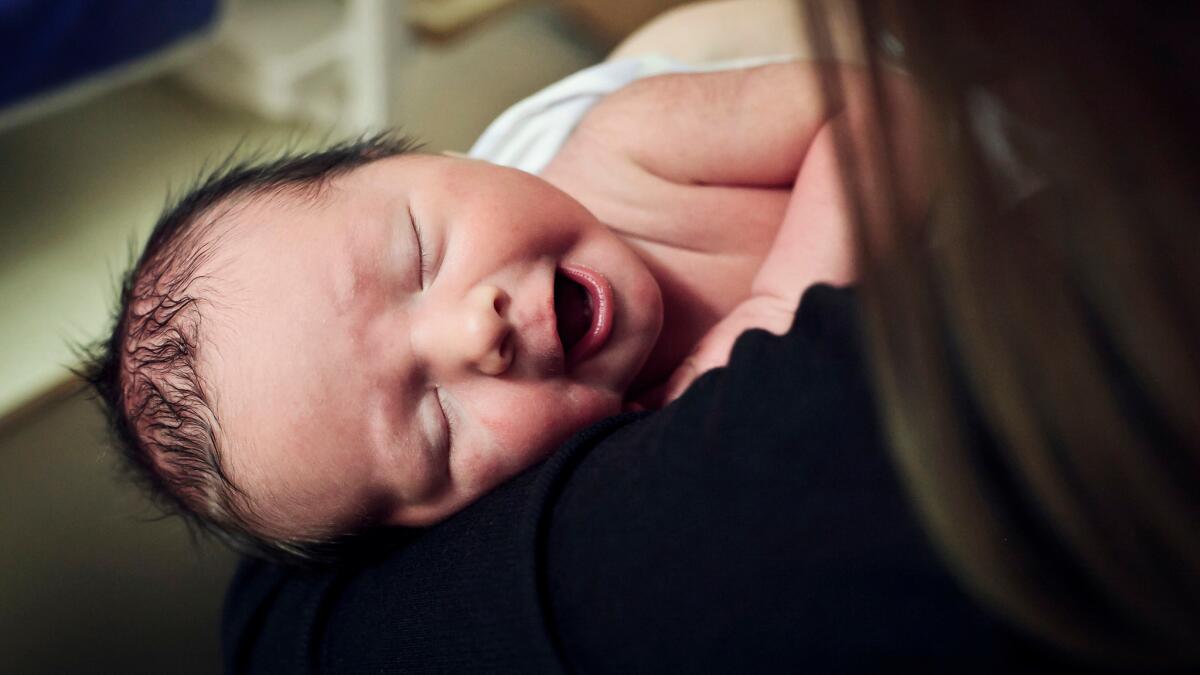With a caesarean section, the path to obesity may begin at birth

- Share via
Your very first moments of life can influence your risk of obesity for years, a new study shows.
Babies delivered via caesarean section were 15% more likely to be obese as kids, teens and young adults than were babies who made the trip through the birth canal, according to the report Wednesday in JAMA Pediatrics.
The risk associated with a C-section was even greater for babies whose mothers had no apparent medical need for the procedure. Compared with babies born vaginally, these babies were 30% more likely to be obese between the ages of 9 and 28, the study found.
These results are based on health records of thousands of people who have been tracked for years by the Growing Up Today Study, or GUTS. These volunteers were born to mothers who were already part of the Nurses’ Health Study 2. That made it feasible for researchers to look for long-term connections between method of birth and obesity risk.
Nutritional epidemiologist Changzheng Yuan of the Harvard T.H. Chan School of Public Health and her study coauthors had good reason to suspect that a C-section put a baby on the path to obesity. Two recent reports that pooled data from other studies found that caesarean birth was associated with a 22% increased risk of obesity.
The trove of GUTS data offered a chance to examine the relationship in far more detail.
Among the 22,068 people included in the study, 13% were obese. But the odds of being obese were greater for the 22% of study participants who were delivered by C-section than for the 78% who weren’t.
In their initial calculations, the researchers found that a caesarean birth was linked with a 30% greater risk of obesity. After they took into account factors like the body mass index of mothers before they became pregnant, the magnitude of the risk dropped to 15% but remained large enough to be statistically significant.
The relationship between C-sections and obesity held up regardless of age or gender. Among preteens between the ages of 9 and 12, those born via C-section were 23% more likely to be obese than those who were born vaginally. For those ages 13 to 18, a C-section was associated with a 16% increased risk of obesity. And for adults ages 19 to 28, the risk was 10% higher.
A C-section birth translated into an 18% greater risk of obesity for boys and a 12% increased risk of obesity for girls, according to the study.
Some of the most intriguing findings were based on the 12,903 people who had siblings in the study. In these cases, babies delivered by C-section were 64% more likely to grow up to be obese than were their brothers and sisters who shared the same womb but were delivered vaginally. And among the 2,815 moms who gave birth via C-section and then had another baby, the younger sibling was 31% less likely to be obese if he or she was delivered vaginally instead of via C-section.
The results bolster the idea that the birth canal is an essential source of microorganisms that are beneficial to health. Inventories of infants’ microbiomes show that babies exposed to the birth canal have a greater variety of bacteria — including more bifidobacteria and fewer staphylococci — than C-section babies. Some scientists believe these birth canal bacteria are so valuable that they’ve swabbed C-section newborns with their mothers’ vaginal fluids shortly after birth. (The long-term effects of this experiment remain to be seen.)
Although more research is needed to understand exactly how a mom’s microbiome influences her child’s risk of obesity, the new findings should prompt doctors and pregnant women to think twice about C-sections that aren’t medically necessary, the study authors concluded.
Follow me on Twitter @LATkarenkaplan and “like” Los Angeles Times Science & Health on Facebook.
MORE IN SCIENCE
Robotic babies intended to reduce teen pregnancies may have had the opposite effect
Experimental drug reduces protein clumps and slows memory loss in early Alzheimer’s
After Ohio passed abortion law, risk of complications nearly tripled





